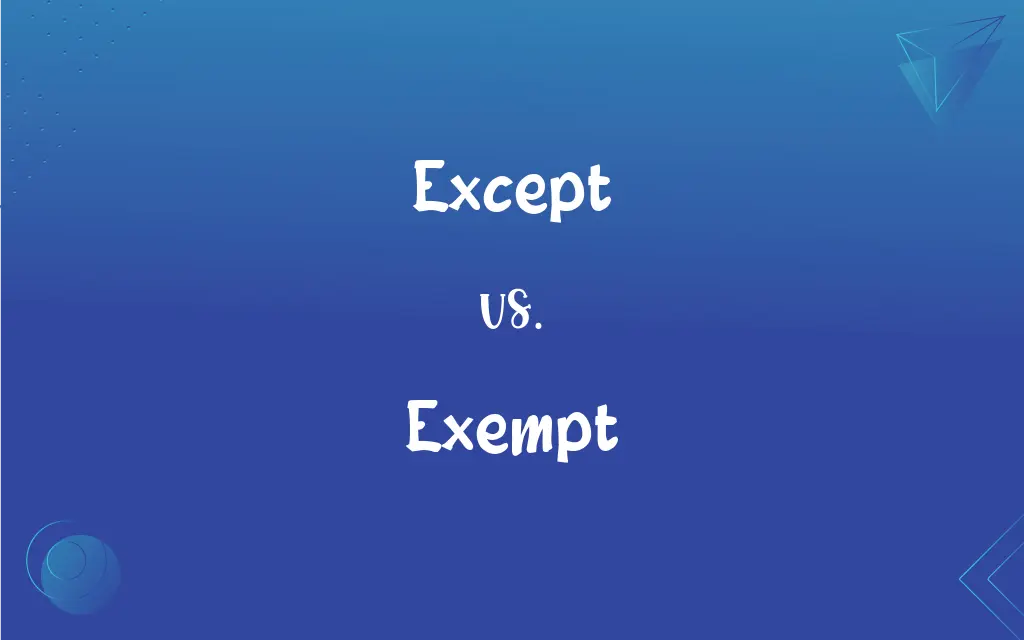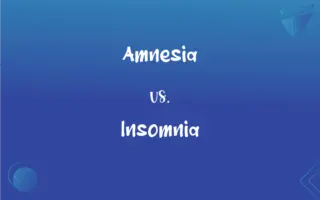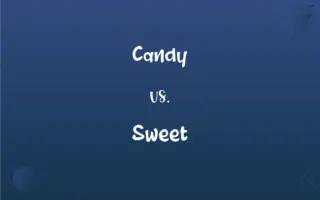Except vs. Exempt: What's the Difference?
Edited by Aimie Carlson || By Harlon Moss || Updated on November 6, 2023
Except means to exclude something; exempt means to be free from an obligation.

Key Differences
Except is a preposition or conjunction that indicates exclusion, often used to specify something that does not apply to a general statement. Exempt, however, is a verb or adjective relating to the act of freeing someone or something from a given duty or obligation. While "except" introduces an exclusion, "exempt" introduces an exclusion from a requirement.
In usage, one might say, “All team members must attend the meeting, except John,” suggesting that John is not required to attend. Alternatively, using exempt, one could say, “John is exempt from attending the meeting,” meaning John is released from the obligation that applies to the rest of the team. "Except" functions to carve out an exception, whereas "exempt" confers a status of being free from certain rules or requirements.
Grammatically, "except" can be seen as a way of partitioning or separating an element from a group, while "exempt" implies a privilege or immunity granted to an individual or entity. One might be excepted by circumstance, but exempt by choice or decree. Except identifies the outliers within a set rule, and exempt signifies who or what is not bound by that rule.
When discussing conditions or stipulations, except is used to qualify or limit the scope, such as in legal documents where specific cases are outlined as being outside of the document's jurisdiction. Exempt, in contrast, is often used in tax law, labor law, or other regulatory texts to denote who does not have to comply with a particular law or requirement. Except sets boundaries within compliance, while exempt denotes a departure from the need to comply.
Therefore, although except and exempt may seem similar in that they both deal with non-inclusion, they are used differently. "Except" is about leaving out something that is otherwise included, and "exempt" is about having an official dispensation from a rule or requirement. Understanding the distinction is crucial for correct usage in both written and spoken language.
ADVERTISEMENT
Comparison Chart
Part of Speech
Preposition, conjunction
Verb, adjective
Function
Indicates exclusion
Indicates immunity or privilege
Usage in a Sentence
"All can go, except Jane."
"Jane is exempt from the rule."
Requirement Status
Implies inclusion with exceptions
Implies freedom from obligation
Legal Context
Specifies non-applicable items
Specifies parties not obliged
ADVERTISEMENT
Except and Exempt Definitions
Except
Used to introduce an exclusion.
I teach every day except Sunday.
Exempt
Freed from a duty or obligation.
She is exempt from the final exam due to her high grades.
Except
Not including; other than.
Everyone went to lunch except me.
Exempt
Not subject to rules that apply to others.
Diplomats are often exempt from parking fines.
Except
To exclude.
Please take all the books except the ones on the top shelf.
Exempt
To release from an obligation.
The charity was exempt from taxes.
Except
But; however.
The trip was fun, except it was too short.
Exempt
Not affected by a given influence or condition.
Some students are exempt from paying tuition fees.
Except
Unless.
We will proceed except we hear otherwise.
Exempt
To be spared from a usual requirement.
Members of the council are exempt from the entrance fee.
Except
With the exclusion of; other than; but
Everyone except me.
Exempt
To free from an obligation, duty, or liability to which others are subject
Exempting the disabled from military service.
Except
If it were not for the fact that; only. Often used with that
I would buy the suit, except that it costs too much.
Exempt
(Obsolete) To set apart; isolate.
FAQs
Can exempt be used as a noun?
No, exempt is not commonly used as a noun; it's used as a verb or adjective.
What does it mean to be exempt from something?
To be exempt means to be free from an obligation or rule that others must follow.
Is except a verb?
No, except is not a verb; it's a preposition or a conjunction.
Can except and exempt be used interchangeably?
No, they serve different grammatical functions and cannot be used interchangeably.
Does exempt have to be authorized by a rule or law?
Yes, exemptions usually come from an authority or established rule.
Can I use except at the beginning of a sentence?
It is uncommon and typically except is used in the middle or end of a sentence.
Can exempt be used in legal contexts?
Yes, exempt is often used in legal contexts to refer to someone or something not subject to a law.
Can exempt apply to anyone or anything?
Exempt typically applies to individuals or entities that meet certain conditions for immunity.
Can except be used in legal contexts?
Yes, except can be used in legal contexts to detail exceptions within a rule or law.
What is the adjective form of except?
Except doesn't have an adjective form; it’s used as a preposition or conjunction.
Is except always followed by a noun or pronoun?
Yes, except is usually followed by a noun or pronoun that it excludes.
Does except have synonyms?
Yes, words like excluding, save for, or barring are synonyms for except.
Can exempt stand alone in a sentence?
Exempt usually does not stand alone; it modifies a noun or is part of a verb phrase.
Can except imply a condition?
Yes, except can imply a condition when used in the sense of 'unless'.
How does except affect a sentence?
Except limits or restricts the scope of what is being discussed by excluding something.
Does exempt have synonyms?
Yes, words like immune, excused, or freed are synonyms for exempt.
What is the noun form of exempt?
Exempt doesn't have a noun form; it's used as a verb or adjective.
Can exempt be conditional?
Exempt can be conditional if the exemption is contingent upon meeting certain criteria.
Is except followed by that?
No, except is not typically followed by "that". It's usually followed by a noun or pronoun.
Can either word be used in a formal context?
Yes, both except and exempt can be used in formal contexts appropriately.
About Author
Written by
Harlon MossHarlon is a seasoned quality moderator and accomplished content writer for Difference Wiki. An alumnus of the prestigious University of California, he earned his degree in Computer Science. Leveraging his academic background, Harlon brings a meticulous and informed perspective to his work, ensuring content accuracy and excellence.
Edited by
Aimie CarlsonAimie Carlson, holding a master's degree in English literature, is a fervent English language enthusiast. She lends her writing talents to Difference Wiki, a prominent website that specializes in comparisons, offering readers insightful analyses that both captivate and inform.































































